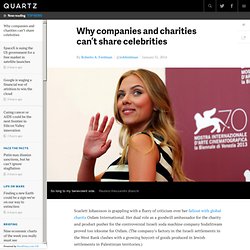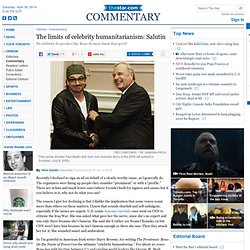

Bono, Beware: Dambisa Moyo on Aid, Microfinance, and the Problem of Celebs in Africa. Dambisa Moyo's Curious Complaint Against Bono's "Glamour Aid" Not long after hearing about Dambisa Moyo’s new book, Dead Aid, in one of our own @U2 OTRs, a few voices came into my world asking if I had read her book or could believe what she said about Bono’s efforts.

I hadn’t read her book. What I did was read some interviews with her and track some of her appearences on her book tour, which are advertised on her website. Don’t know if I will read her book now that I’ve learned more about her core arguments, which are: aid, especially charitable aid, doesn’t help Africa as much as some Westerners might think; many African governments are corrupt; trade with Africa and a home-grown economy are what Africa needs for a better, sustainable, future; celebrities don’t help Africans by portraying the continent as second-rate, desperate and hungry. (She wrote a book on these points?) The more I read, the more I thought of all Bono has said since joining the Jubilee 2000 campaign in 1999. To me, the most informative interview was with Guernica. Half the Sky: half humanitarian heroics, half celebrity ego trip.
Actress Olivia Wilde hangs at the Umoja Women’s Village in Kenya as part of Half the Sky.

(Photo via PBS) Newsflash: being a woman is surreal. Last night I was supposed to be at the gym. So I could look slimmer and prettier or something. But I had a headache. The documentary sprung from the book by Nicholas Kristof and Sheryl WuDunn, carrying on the crusade against violence, discrimination, and lack of education visited upon women around the world. These aren’t stories about women trying to lose weight and look prettier. They’re just trying to take their next breath. The second section of Half the Sky airs tonight on PBS. Why celebrity activism does more harm than good. International celebrities John Travolta and Kelly Preston were in South Africa for the World Cup Opening ceremonies in 2010 and paid a visit to the Nelson Mandela Childrens Foundation where they gave a donation of R 70 000 to benefit children’s projects.

(Flickr/Jennifer Su) As I sat in the stands of Pece Stadium in the northern Uganda town of Gulu on a sunny Sunday morning, a couple of young men made their way close to where I was sitting. We struck up a conversation, and they said that it was a pity that I had not witnessed the event that had taken place not long before my arrival in town a few weeks earlier. My new friends began to describe how there had been a massive gathering in the stadium for the screening of a video put together by a foreign NGO. The video had profoundly upset a significant amount of those present that evening, and a riot broke out. Celebrity-led campaigns do often prove to be highly successful in generating broad public support. Why companies and charities can’t share celebrities. Scarlett Johansson is grappling with a flurry of criticism over her fallout with global charity Oxfam International.

Her dual role as a goodwill ambassador for the charity and product pusher for the controversial Israeli soda machine company SodaStream proved too irksome for Oxfam. (The company’s factory in the Israeli settlements in the West Bank clashes with a growing boycott of goods produced in Jewish settlements in Palestinian territories.) Johansson scrambled to justify her dual role on her blog before resigning from her Oxfam post, but she isn’t the first celebrity to run into branding wars between companies and charities that shimmy up to a shared glitzy endorser.
Here are other examples of the endorsement battles between brands and humanitarian groups over their celebrity ties: 1. Sex and the City star Kristin Davis faced a similar falling out with Oxfam after partnering with cosmetics company Ahava Dead Sea Laboratories back in 2009. 2. 3. Brad Pitt is the latest filthy disgusting rich fake humanitarian celebrity pig to make a carefully planned statement giving the illusion of support when in fact, he is another overpaid juggernaut representative of big business. DON'T FALL FOR. Posted 2 years ago on Nov. 20, 2011, 6:41 a.m.

EST by ModestCapitalist (2342) This content is user submitted and not an official statement The rich and famous do not want to be seen as 'pigs' or go down in history as 'villains'. They want to be seen as 'heros' and go down in history as 'humanitarians'. The market for their product has become global.
The fan base has become global. This is why the rich and famous have all taken up 'philanthropy' or 'good will' around the world. Charitywatch.org and Charitynavigator.org are both non-profit charity watchdogs. The fans have been terribly misled. Virtually every penny 'donated' by Angelina Jolie and Brad Pitt to date has come from repeated sales of baby photos. The limits of celebrity humanitarianism: Salutin. Recently I declined to sign an ad on behalf of a clearly worthy cause, as I generally do.

The organizers were lining up people they consider “prominent” or with a “profile.” There are A-lists and much lower ones (where I reside) both for signers and causes but if you believe in it, why not do what you can? The reason I give for declining is that I dislike the implication that some voices count more than others on these matters. I know that sounds churlish and self-indulgent, especially if the issues are urgent. U.S. comic Janeane Garofalo once went on CNN to criticize the Iraq War.
So I’m grateful to American-Irish writer Harry Browne, for writing The Frontman: Bono (In the Name of Power) on the ultimate “celebrity humanitarian.” Browne knows music, politics and economics; you leave the book feeling you understand better why you were uncomfortable with Bono’s activism — or I did. Browne isn’t mingy. Re.